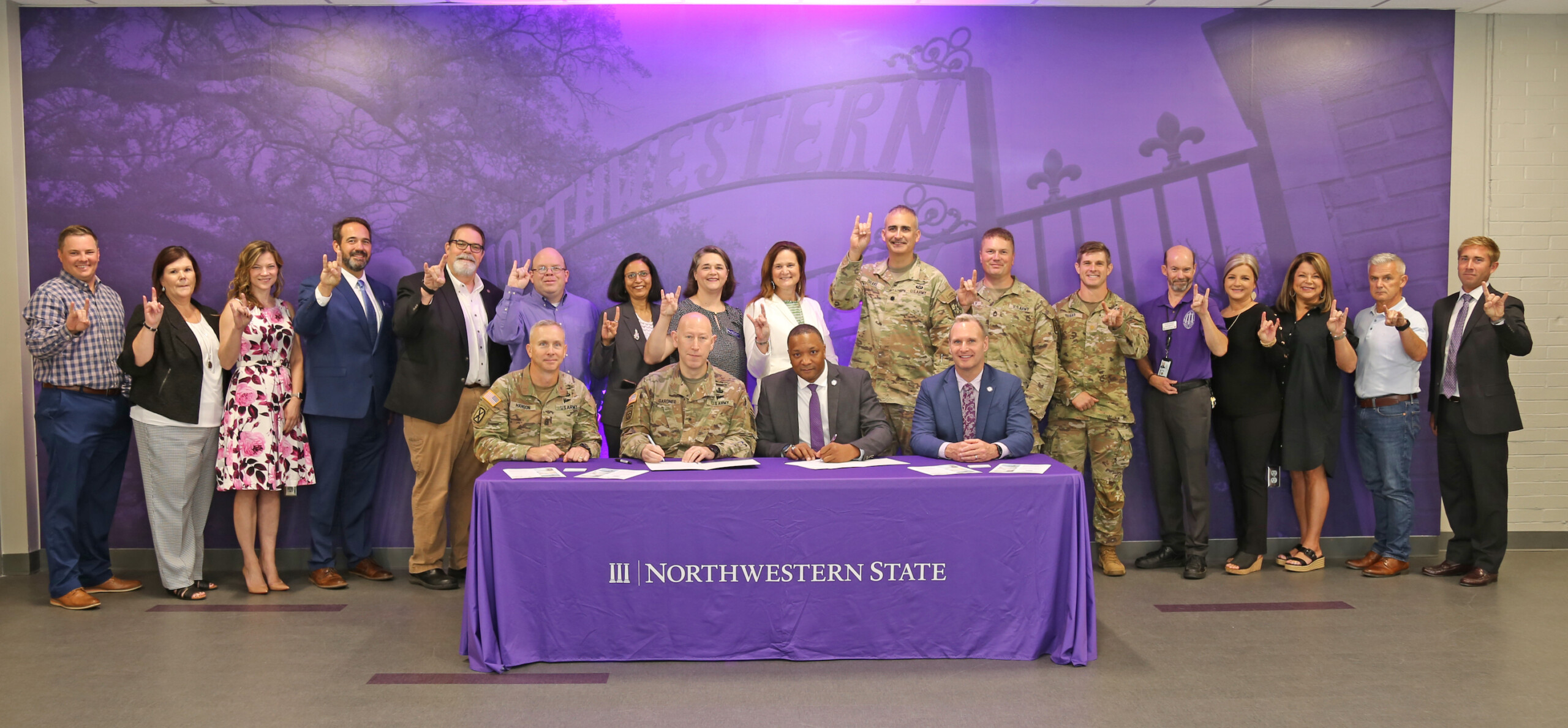NATCHITOCHES – Administrators from Northwestern State University and Fort Polk, formerly Fort Polk, announced two memorandums of understanding, one in which the training soldiers receive can be applied as college course credits towards a bachelor’s degree and a second to use job-embedded training as credits towards a master’s degree.
Commanding General David Gardner, Joint Readiness Training Center and Fort Polk, and NSU President Dr. Marcus Jones formalized the agreement Aug. 30.
“Historically, we have had seven program areas available to soldiers and their dependents. Over the past few months, we have worked with Fort Polk, academic deans and each of our colleges to identify additional programs that would be appropriate for the Fort Polk community,” said Laurie Morrow, NSU’s executive director for Economic Development, Innovation and Outreach.
“We found an additional 20 degree programs for a total of 27 that are eligible through this new MOU for students at Fort Polk,” said Dr. Greg Handel, NSU’s provost and vice president for Academic Affairs. “A lot of the degree programs are in high need areas, in our College of Education and Human Development, specifically psychology and social work. As we continue to see needs in those areas, we’re grateful to be able to continue to develop articulation agreements such as this.”
Through the first agreement, soldiers can earn 16 hours of college course credit based on completion of the Observer Coach Trainer (OCT) Academy plus 12 months serving as a Joint Readiness Training Center OCT. Fort Polk soldiers can then apply to earn 16 hours of Military Science Leadership (MSL) college course credit. With one additional course in military history, service members will have completed the requirements for a minor in Military Leadership. This minor can be applied to many bachelor’s degree programs offered at NSU.
For example, a Bachelor of Science in Psychology includes 120 credit hours. With the OCT Accreditation and experience, a soldier will be awarded 16 out of 120 hours equal to 13 percent of the degree.
Through the second agreement, services members can pursue a master’s degree while completing the OCT Accreditation and Rotational Experience. Service members are eligible for nine graduate hours at NSU based on completion of the OCT Academy plus 12 months serving as a Joint Readiness Training Center OCT. Soldiers can begin the Master of Science degree in Homeland Security or Master of Arts in Adult Learning and Development with concentration in Homeland Security before, during or after completion of the OCT Academy. These graduate programs range from 30-36 credit hours.
“OCT stands for Observer Coach and Trainer,” Gardner explained “The Army invests every month about $30 million to send its formations, organizations and its units down to the Joint Readiness Training Center so they can be ready if they are called upon by the nation to fight and win. What an OCT does is help them on that path.”
Gardner said OCTs are handpicked and trained in how to help others learn and improve, similar to a consultant who observes and assesses an organization and trains it to reach its objectives.
An OCT is “someone who has interpersonal skills, has the intellect and is competent in their particular area of expertise and, more importantly, understands when they are observing someone whether they have to step in coach or if they have to take that additional step and help them train,” he said.
“We very much appreciate Dr. Jones and the faculty for developing some of these programs for our OCTs to get better and pursue their own improvement through education by getting credit for some of the things they do every day,” Gardner said. “We thank NSU and all the faculty for helping us accomplish this and we hope that we can provide an opportunity for the students here who perhaps have no military connection, but are curious about what we do at the Joint Readiness Training Center.”
NSU has served approximately 460 active duty soldiers and/or their eligible dependents in the last year.
For more information on the college course credit option or the graduate program, contact LTC Joshua Drake, professor of Military Science, at drakej@nsula.edu to be connected with an academic advisor.
Information on NSU’s Department of Military Science is available at www.nsula.edu/rotc.

